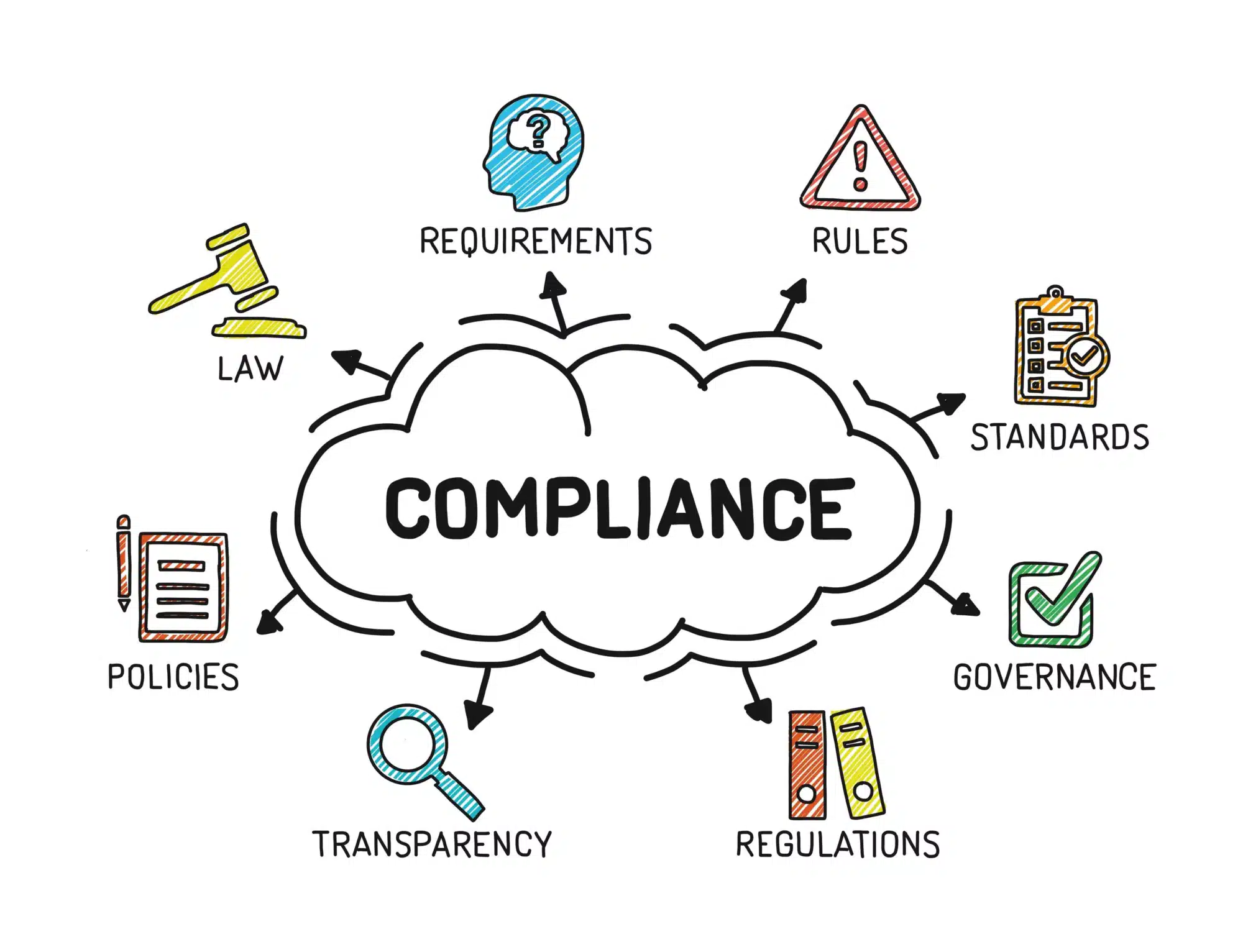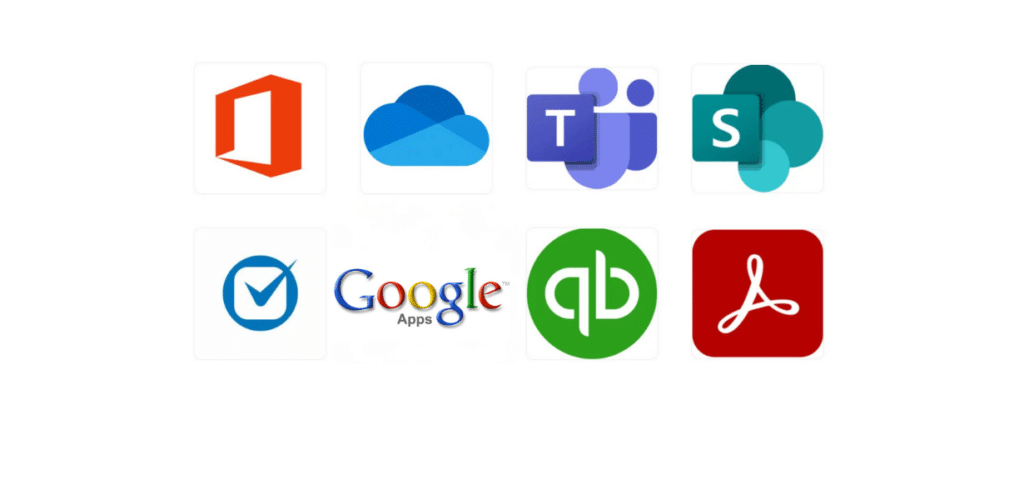
Listen here to listen to Top 5 IT Challenges Law Firms Faces in 2025 & How To Fix Them
Executive Summary
Technology has become an indispensable component of modern legal practice, offering small law firms unprecedented opportunities for efficiency, client service, and growth. However, this digital transformation also introduces a unique set of challenges, particularly in the realm of information technology. This report identifies the top 5 IT challenges currently confronting small law firms, derived from recent industry analysis and trends. These challenges encompass fortifying cybersecurity and ensuring data privacy, streamlining operations through effective legal software integration, enabling secure and productive remote work environments, strategically navigating the adoption of artificial intelligence, and overcoming budgetary constraints in IT investment and support. Addressing these issues proactively is not merely an operational necessity but a strategic imperative for small law firms to maintain a competitive edge, safeguard sensitive client information, ensure regulatory compliance, and ultimately, foster client trust and satisfaction. This report provides actionable solutions and best practices that small law firms can implement to mitigate these challenges and build a resilient IT infrastructure for the future.
Introduction: The Evolving Technological Landscape for Small Law Firms
In today’s dynamic legal landscape, technology has moved from being a mere tool to an essential foundation for the operation and expansion of small law firms. From managing client communications and case files to conducting legal research and billing, technology underpins nearly every facet of a modern legal practice. It enables smaller firms to compete effectively with larger counterparts, offering opportunities to enhance efficiency, improve client engagement, and even expand their reach beyond geographical limitations. The internet has indeed leveled the playing field, allowing smaller firms to vie for attention and clients in an increasingly crowded online marketplace. For instance, a user-friendly website equipped with online appointment scheduling and secure client portals can significantly enhance a small firm’s ability to meet the “digital-first” expectations of today’s clients.
However, while the integration of technology offers numerous advantages, it also presents a unique set of challenges, particularly for small law firms that often operate with limited resources and without dedicated IT departments. These firms may find themselves grappling with complex issues such as ensuring the security of sensitive client data, integrating disparate software systems, adapting to remote work models, understanding and implementing new technologies like artificial intelligence, and managing IT costs effectively. The rapid pace at which technology evolves can be particularly overwhelming, potentially leading to hesitation or delays in adopting necessary tools and practices. As soon as a firm adopts a new technology, another one may emerge, potentially rendering the initial investment seemingly obsolete. This constant evolution can contribute to a sense of “technology fatigue” and a reluctance to embrace new tools, even when they could offer significant benefits. Recognizing and effectively addressing these IT challenges is crucial for small law firms to not only survive but thrive in an increasingly digital and competitive environment. By proactively tackling these obstacles, small law firms can build a robust and secure IT infrastructure that supports their practice, protects their clients, and positions them for sustained success
The Top 5 IT Challenges for Small Law Firms
Challenge 1: Fortifying Cybersecurity and Ensuring Data Privacy
A paramount concern for small law firms today is the escalating threat of cyberattacks and the imperative to ensure the privacy and security of sensitive client data. Law firms, by their very nature, handle a wealth of confidential information, including trade secrets, personal data, and financial records, making them prime targets for cybercriminals. These malicious actors are becoming increasingly sophisticated, employing tactics like phishing, ransomware, and data breaches, with attacks on law firms showing a disturbing upward trend. Notably, smaller firms, particularly those with 10 to 49 employees, are disproportionately likely to experience these security incidents. This is often because they may lack the robust security infrastructure and dedicated IT support found in larger organizations, leading to a dangerous misconception that their smaller size makes them less of a target. In reality, small businesses, including law firms, are often seen as easier targets due to potentially weaker security measures.
The financial repercussions of a data breach for a law firm can be substantial, extending beyond immediate recovery costs to include potential legal fees, regulatory fines, and significant reputational damage. The average cost of a data breach for law firms reached over $5 million in 2024, a stark indicator of the potential financial devastation. Beyond the financial implications, lawyers are bound by stringent ethical and legal obligations to safeguard client information. Rules such as the American Bar Association’s Model Rule 1.6 mandate that attorneys must make reasonable efforts to prevent unauthorized access to client data. Failure to comply with data privacy regulations like GDPR, CCPA, and HIPAA can result in severe penalties, legal liabilities, and a loss of client trust. The shift towards remote work has further amplified these vulnerabilities, as attorneys accessing sensitive data from home networks or public Wi-Fi connections can introduce additional security risks. Compounding these challenges is the emergence of advanced cyber threats leveraging artificial intelligence and deepfakes. AI can be used to craft more convincing phishing emails, while deepfake technology can facilitate sophisticated impersonation attacks, making it even more critical for small law firms to remain vigilant and implement robust security protocols. Furthermore, a significant number of law firms still lack clear cybersecurity policies and fail to provide adequate training to their employees, leaving them susceptible to human error, which remains a leading cause of security incidents. Addressing these multifaceted cybersecurity and data privacy concerns is not just an IT issue but a fundamental aspect of protecting the firm’s reputation, ensuring compliance, and upholding the ethical responsibilities inherent in the practice of law.


Challenge 2: Streamlining Operations Through Effective Legal Software Integration
Another significant hurdle for small law firms is the challenge of optimizing their operational efficiency through the effective integration of various legal software systems. Many small practices find themselves utilizing a collection of disparate software solutions for different functions, such as case management, billing and time tracking, document management, customer relationship management (CRM), human resources, and accounting. The lack of seamless integration between these systems often results in inefficient workflows, characterized by manual data entry, inconsistencies in data, and a limited capacity for automation. This fragmented approach can not only hinder productivity but also introduce cybersecurity vulnerabilities and impede effective collaboration among team members, ultimately impacting the quality of client service.
The growing recognition of the need to enhance profitability and elevate client service is driving the demand for improved software integration within small law firms. Integrated systems offer the promise of automating routine tasks, streamlining processes, and providing a more cohesive and efficient experience for both the firm’s staff and its clients. A key trend emerging in response to this need is the increasing adoption of cloud-based practice management software. These platforms are designed to consolidate various essential legal functions into a single, accessible environment, often including features for case management, billing, document storage and management, calendaring, and client communication. The accessibility and scalability of cloud-based solutions make them particularly attractive to small law firms that may lack the resources for extensive on-premise IT infrastructure. Furthermore, even firms that have existing Legal Management Systems (LMS) may find that these systems possess underutilized automation capabilities that could address some of their integration challenges. Before investing in new software, small law firms should explore the full potential of their current tools, as replacing a legacy system could potentially resolve numerous vulnerabilities and streamline multiple processes simultaneously. Ultimately, strategically integrating legal software is crucial for small law firms to optimize their operations, improve efficiency, and deliver enhanced value to their clients.
Challenge 3: Enabling Secure and Productive Remote Work Environments
The shift towards remote and hybrid work models has become increasingly prevalent across industries, and small law firms are no exception. This evolving work landscape presents a unique set of IT challenges that these firms must address to maintain both security and productivity. A primary concern is ensuring that attorneys and staff can securely access critical case files and other firm resources from a variety of locations, including home offices, client sites, and while traveling. This need for remote access must be balanced with the imperative to protect sensitive client data from unauthorized access and cyber threats, especially when employees are using potentially less secure home networks or personal devices.
Maintaining effective communication and seamless collaboration among team members who are not physically co-located is another significant challenge. Ensuring that everyone stays informed about case progress, deadlines, and client interactions requires the implementation of appropriate communication and collaboration tools. Furthermore, managing IT resources and providing technical support to a distributed workforce can be more complex than supporting an office-based team. Legacy or proprietary video conferencing solutions that some firms may still be using might not be compatible with the more common and user-friendly platforms that remote workers expect and are familiar with.
Cloud-based solutions have emerged as a cornerstone for enabling secure and productive remote work environments for small law firms. By storing data and hosting applications in the cloud, firms can provide their employees with anywhere access to the tools and information they need to perform their work, fostering flexibility and ensuring business continuity. Implementing robust Mobile Device Management (MDM) policies is also crucial for securing firm data that may reside on employee-owned or firm-provided mobile devices used for remote work. MDM solutions can help firms manage device access, enforce security protocols such as password requirements and encryption, and even allow for remote wiping of data in the event a device is lost or stolen. Additionally, the adoption of secure and reliable collaboration tools, including video conferencing platforms, instant messaging applications, and secure document sharing systems, is vital for maintaining team cohesion, facilitating communication, and ensuring that remote team members can work together effectively on client matters.


Challenge 4: Strategically Navigating the Adoption of Artificial Intelligence
Artificial intelligence (AI) is rapidly evolving and making significant inroads into the legal industry, presenting both transformative opportunities and novel challenges for small law firms. AI-powered tools possess the potential to automate a wide range of routine legal tasks, such as drafting documents, conducting legal research, and summarizing case information, thereby significantly improving efficiency and freeing up lawyers to focus on more complex and strategic work. For instance, AI can assist with tasks like document indexing, time tracking, and even eDiscovery and document preparation.
However, effectively integrating AI into a small law firm’s operations is not as simple as implementing a new software. It requires careful planning to identify which specific AI tools are best suited to the firm’s needs and practice areas. Once appropriate tools are selected, it is crucial to provide adequate training and support to all staff members to ensure they can utilize these technologies effectively and ethically. The adoption of AI also raises several important ethical concerns that small law firms must address, including issues related to data privacy, client confidentiality, and potential biases inherent in AI algorithms. Furthermore, the regulatory landscape surrounding AI in the legal profession is still evolving, leading to uncertainty about compliance requirements. Small law firms must navigate these complexities while also striving to maintain the essential human judgment and empathy that clients value in their legal representation.
Despite these challenges, the adoption of generative AI among small law firms has nearly doubled in recent years, indicating a growing awareness of its potential benefits and a willingness to embrace this technological shift. This trend suggests that small firms are increasingly recognizing that AI can help them enhance their efficiency, improve client service, and remain competitive in the market. A key trend in this adoption is the focus on leveraging AI to enhance client experience and provide technology-driven client services. AI-powered chatbots and other tools can improve communication, provide real-time updates, and offer more personalized services, ultimately leading to increased client satisfaction. For small law firms that are just beginning to explore AI, a recommended approach is to start with low-risk, internal back-office tasks. This allows them to test and understand the capabilities of AI without directly impacting client-facing workflows. By strategically and thoughtfully integrating AI, small law firms can unlock significant efficiencies and enhance their ability to serve their clients effectively.
Challenge 5: Overcoming Budgetary Constraints in IT Investment and Support
A persistent challenge for small law firms is managing their often-limited budgets when it comes to investing in IT infrastructure, software, and ongoing technical support. Many firms hesitate to make significant upfront investments in technology, particularly when the long-term return on investment may not be immediately apparent. Determining the appropriate level of IT spending can also be difficult, as there is often a lack of specific data and benchmarks tailored to the unique needs and constraints of small law practices. Consequently, small law firms frequently find themselves in a position where they must carefully balance the need to control costs with the necessity of implementing essential IT security measures and maintaining functional technology systems. Finding cost-effective IT solutions that specifically cater to the requirements of a law practice can be a time-consuming and often daunting task. However, the potential costs associated with inadequate IT, such as downtime due to system failures or significant financial losses and reputational damage resulting from data breaches, can far outweigh the initial investment in proper IT solutions.
Cloud-based services have emerged as a particularly attractive option for small law firms seeking to overcome budgetary constraints in IT. By utilizing cloud-based software and infrastructure, firms can often reduce the need for large upfront capital expenditures on hardware and instead opt for more flexible subscription-based pricing models, allowing them to pay for the resources they use and scale their services up or down as needed. Engaging with Managed IT Services Providers (MSPs) can also be a cost-effective strategy for small law firms to access comprehensive IT support without the expense of hiring and maintaining a full-time in-house IT staff. MSPs typically offer a range of services, including proactive monitoring, maintenance, security management, and help desk support, all for a predictable monthly fee. Furthermore, small law firms can leverage a variety of free or low-cost cybersecurity tools and resources to enhance their security posture without incurring significant expenses. These may include built-in operating system firewalls and encryption tools, free password managers, and readily available cybersecurity training materials. By strategically exploring these cost-effective options, small law firms can build a resilient and secure IT infrastructure that supports their practice without straining their financial resources.
Actionable Solutions and Best Practices
To address the multifaceted IT challenges outlined above, small law firms can implement a range of actionable solutions and best practices.
For Cybersecurity and Data Privacy:
Implementing Multi-Factor Authentication (MFA) for all user accounts is a fundamental step in bolstering security. MFA requires users to provide two or more verification factors to gain access, significantly reducing the risk of unauthorized entry even if a password is compromised. Encrypting sensitive data, both when it is stored (at rest) and when it is being transmitted (in transit), is also crucial to protect it from unauthorized access. Conducting regular security audits and vulnerability assessments can help identify potential weaknesses in the firm’s IT infrastructure, allowing for proactive remediation. Providing comprehensive and ongoing cybersecurity training to all staff members is essential to educate them about potential threats like phishing and to ensure they understand and adhere to security policies. Developing and implementing a well-defined incident response plan (IRP) is critical for ensuring a swift and effective response in the event of a security breach. Establishing strong password policies and encouraging the use of reputable password managers can help employees create and manage complex, unique passwords for all their accounts. Limiting access to sensitive data based on the principle of least privilege ensures that employees only have access to the information necessary to perform their specific job duties. Keeping all software and operating systems updated with the latest security patches is vital for addressing known vulnerabilities that cybercriminals could exploit. Implementing and maintaining a properly configured firewall acts as a crucial first line of defense against unauthorized network access. Regularly backing up critical data to a secure offsite location or cloud service ensures business continuity in the event of a data loss incident, such as a ransomware attack. Small law firms should also consider obtaining cyber liability insurance to help mitigate the financial risks associated with data breaches. Finally, it is essential to carefully vet all third-party vendors who may have access to the firm’s data, ensuring they have robust security measures in place.
For Legal Software Integration:
Prioritizing cloud-based practice management software that offers integrated features for various essential functions like case management, billing, document management, and client communication can significantly streamline operations. Small law firms should also assess their current software systems to identify potential integration capabilities or underutilized features that could address some of their needs. Before selecting any new software, it is crucial to develop a clear understanding of the firm’s specific needs, goals, and budget. A well-thought-out plan for transitioning to new software, including data migration strategies and comprehensive staff training, is essential for a smooth implementation. When evaluating software options, firms should look for solutions with open APIs (Application Programming Interfaces) that allow for seamless integration with other essential tools and platforms they may already be using. It can also be beneficial to consider starting with one core integrated platform and gradually adding other integrated solutions as the firm’s needs evolve.
For Secure and Productive Remote Work:
Implementing Virtual Private Networks (VPNs) provides a secure and encrypted connection for remote employees accessing the firm’s network and resources. Utilizing cloud-based file storage and document management systems with strong security features ensures that remote workers can access necessary files securely from any location. Establishing and enforcing Mobile Device Management (MDM) policies and deploying MDM software is critical for managing and securing firm data on remote devices, whether they are employee-owned or company-provided. Providing secure and reliable collaboration tools, such as video conferencing platforms, instant messaging applications with encryption, and secure client portals, facilitates effective communication and teamwork among remote team members. Implementing strong authentication measures, including Multi-Factor Authentication (MFA), for all remote access points adds a crucial layer of security. Educating remote employees on cybersecurity best practices specifically for home networks and personal devices is vital to mitigate potential risks. Finally, ensuring that employees use secure and trusted Wi-Fi networks when accessing firm resources is an important security precaution.
For Strategic AI Adoption:
Small law firms should begin by identifying specific areas within their practice where the implementation of AI could yield the most significant benefits, starting with low-risk, internal tasks such as document indexing or time tracking. It is crucial to thoroughly research and evaluate various AI tools available on the market to ensure they align with the firm’s specific needs, practice areas, and budgetary constraints. Providing comprehensive training and ongoing support to all staff members on how to effectively and ethically utilize the chosen AI tools is essential for successful adoption. Establishing clear guidelines and firm-wide policies for the responsible and ethical use of AI is paramount, particularly addressing concerns related to data privacy, client confidentiality, and the potential for biases in AI outputs. Firms should continuously monitor the performance and accuracy of their AI tools and make necessary adjustments to optimize their effectiveness. Staying informed about the rapidly evolving legal and ethical landscape surrounding AI in the legal profession is also crucial for making informed decisions and ensuring compliance.
For Overcoming Budgetary Constraints:
Exploring and adopting cloud-based software and services can significantly reduce the need for large upfront investments in IT infrastructure. Engaging with Managed IT Services Providers (MSPs) can offer a cost-effective way to access comprehensive IT support and expertise for a predictable monthly fee, eliminating the need for hiring a full-time IT staff. Leveraging free or low-cost cybersecurity tools and resources, such as built-in operating system security features and free training materials, can help improve the firm’s security posture without significant financial outlay. Prioritizing IT investments based on the firm’s most critical needs and the potential return on investment ensures that limited resources are allocated effectively. Phasing in new technologies gradually, rather than implementing everything at once, can help spread out the costs over time and minimize disruption to the firm’s operations. Taking advantage of free trials and demonstrations offered by software vendors allows firms to thoroughly evaluate the suitability of a product before committing to a purchase. Exploring potential discounts or bundled offers that may be available through software vendors or bar associations can also help reduce overall IT costs.

Table 1: Top 5 IT Challenges and Solutions
| Challenge Number | Challenge Description | Key Solutions/Best Practices | |
| 1 | Fortifying Cybersecurity and Ensuring Data Privacy | Implement MFA, encrypt data, conduct regular audits, provide staff training, develop an IRP. | |
| 2 | Streamlining Operations Through Effective Legal Software Integration | Prioritize cloud-based practice management software, assess current software for integration, plan transitions carefully. | |
| 3 | Enabling Secure and Productive Remote Work Environments | Implement VPNs, use secure cloud storage, establish MDM policies, provide secure collaboration tools, enforce MFA for remote access. | |
| 4 | Strategically Navigating the Adoption of Artificial Intelligence | Identify beneficial AI areas, research tools thoroughly, provide staff training, establish ethical use policies, monitor performance. | |
| 5 | Overcoming Budgetary Constraints in IT Investment and Support | Explore cloud services, consider MSPs, leverage free/low-cost tools, prioritize investments, phase in new technologies. |
Table 2: Cost-Effective Cybersecurity Tools and Resources
| Tool/Resource Name | Category | Cost | Brief Description/Benefit | |
Built-in Firewall (Windows, macOS) | Firewall | Free (Included with OS) | Provides a basic but essential barrier against unauthorized network access. | |
| Built-in Encryption (BitLocker, FileVault) | Encryption Software | Free (Included with OS) | Encrypts hard drives to protect data if a device is lost or stolen. | |
| Free Password Managers (e.g., Bitwarden) | Password Manager | Free | Helps users create and securely store strong, unique passwords for all accounts. | |
| Free MFA Apps (e.g., Microsoft Authenticator, Google Authenticator, Authy) | MFA App | Free | Provides a second layer of security for logins by generating time-based codes. | |
| Cyber Readiness Institute | Training Resource | Free | Offers a free online program to help small businesses improve their cybersecurity practices. | |
| Bar Association Resources | Training Resource | Often Free for Members | Many bar associations offer free webinars and guides on cybersecurity for legal professionals. | |
| FTC and CISA Guides | Training Resource | Free | Government agencies provide free resources and best practices for cybersecurity. |

The Path Forward: Building a Resilient IT Infrastructure
Effectively managing IT within a small law firm is not a one-time project but an ongoing process that demands continuous attention, adaptation, and a proactive approach. The technological landscape is constantly evolving, with new tools and threats emerging regularly. Therefore, small law firms must commit to staying informed about the latest advancements in technology and the ever-changing nature of cybersecurity threats. This includes regularly reviewing and updating their IT policies and procedures to ensure they remain relevant and effective in addressing current challenges. Building a culture of cybersecurity awareness within the firm is also paramount. All employees should understand their role in protecting the firm’s and clients’ data and be empowered to recognize and report potential security risks. When the expertise or resources are not available in-house, small law firms should not hesitate to seek advice and support from qualified IT professionals or consultants who specialize in the legal industry. These experts can provide valuable guidance on selecting and implementing appropriate technologies, strengthening security measures, and ensuring compliance with relevant regulations. By embracing a mindset of continuous improvement and proactive management, small law firms can build a resilient IT infrastructure that supports their current needs and positions them for future success in an increasingly digital world.
Conclusion
This report has identified the top 5 IT challenges that small law firms are currently facing: fortifying cybersecurity and ensuring data privacy, streamlining operations through effective legal software integration, enabling secure and productive remote work environments, strategically navigating the adoption of artificial intelligence, and overcoming budgetary constraints in IT investment and support. For each of these challenges, we have explored the underlying issues and provided actionable solutions and best practices that small law firms can implement to mitigate these risks and enhance their IT capabilities. Addressing these challenges proactively is not merely about adopting the latest gadgets or software; it is about building a robust and secure foundation that allows small law firms to operate efficiently, protect sensitive client information, comply with ethical and legal obligations, and ultimately, provide exceptional service to their clients. While the technological landscape will continue to evolve, by embracing a strategic and proactive approach to IT management, small law firms can harness the power of technology to not only overcome these challenges but also to thrive and succeed in the years to come.
eSudo is a good partner in developing and supporting long-term performance, in-office, and remote needs, cybersecurity safety, and virtual workspace to any office to the next level.


